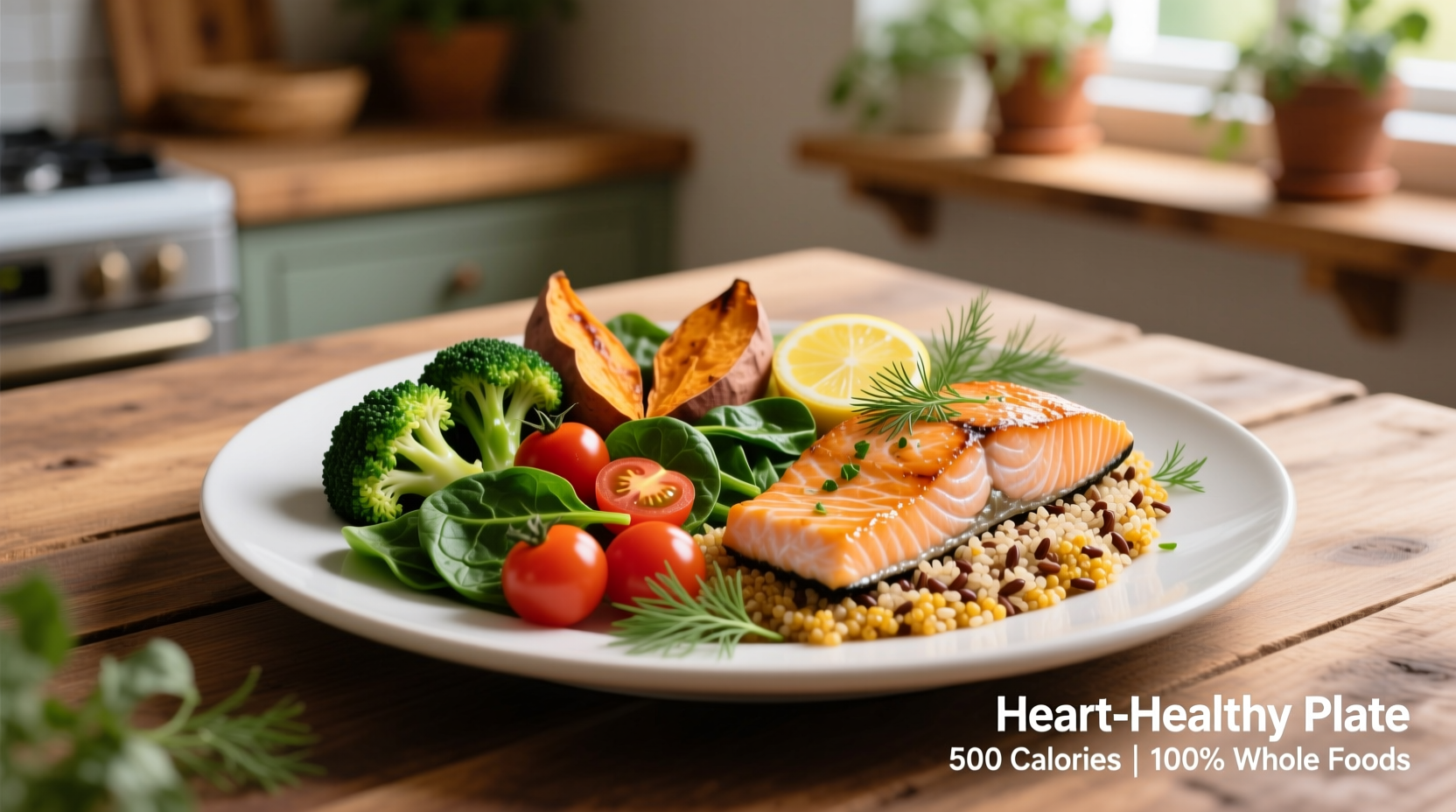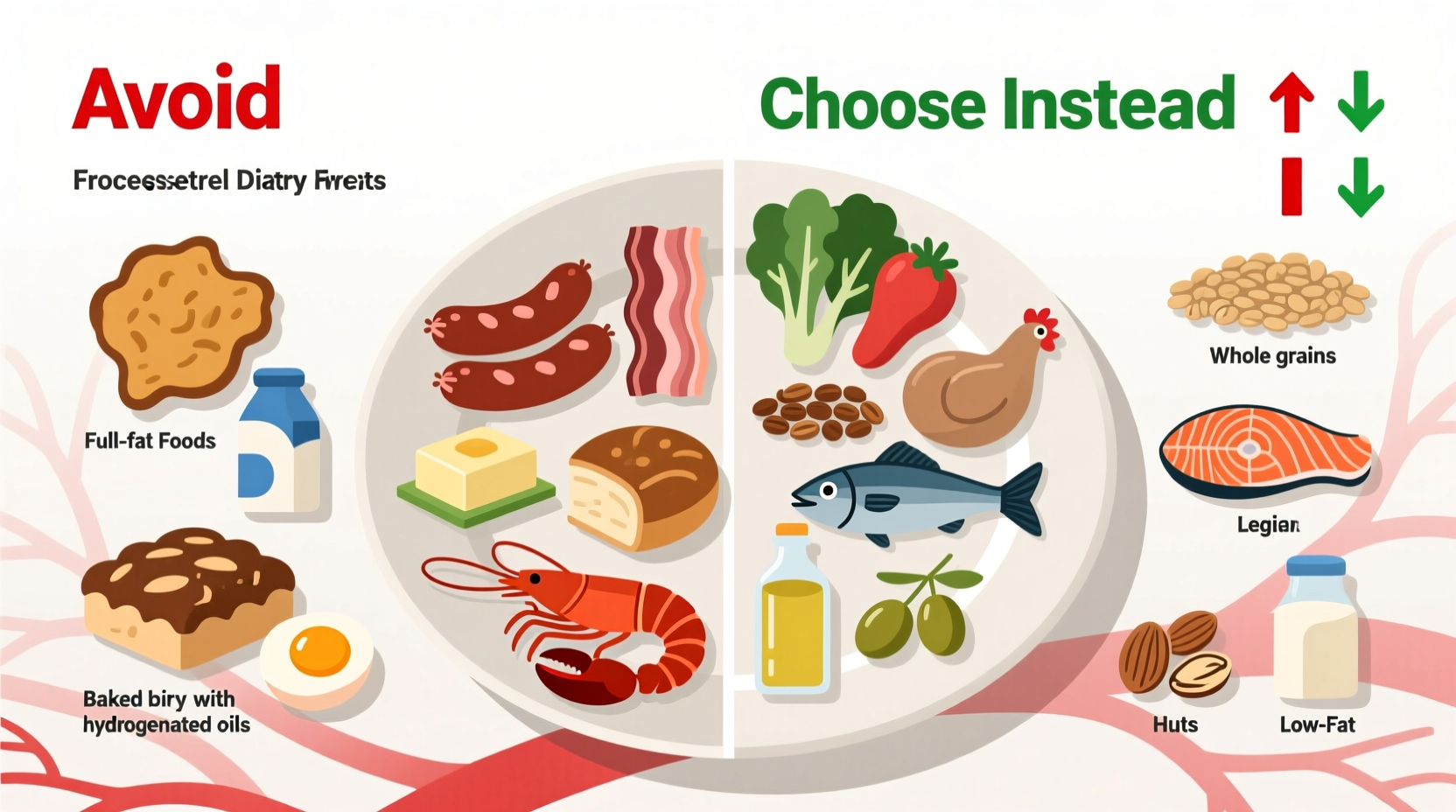If you're managing high cholesterol, immediately eliminate these foods: trans fats (found in fried foods and processed snacks), saturated fats (in red meat and full-fat dairy), and excessive dietary cholesterol (from organ meats and egg yolks). These significantly raise LDL ("bad") cholesterol levels and increase heart disease risk according to the American Heart Association.
Key Action Plan: Cut trans fats completely, limit saturated fats to less than 6% of daily calories, reduce dietary cholesterol to under 300mg daily, and increase soluble fiber intake to 5-10g daily. These changes can lower LDL cholesterol by 10-15% within 4-6 weeks based on National Institutes of Health research.
Understanding Cholesterol and Dietary Impact
Cholesterol management requires understanding how different foods affect your lipid profile. While your liver produces most of your cholesterol, certain dietary components significantly influence your blood levels. LDL (low-density lipoprotein) cholesterol contributes to plaque buildup in arteries, while HDL (high-density lipoprotein) helps remove excess cholesterol. The foods you eat directly impact this balance, with some dramatically worsening your levels.
Foods That Raise Cholesterol: What to Eliminate
Not all cholesterol-raising foods are obvious. Many contain hidden ingredients that sabotage your heart health. Here's what to avoid and why:
1. Processed Foods with Trans Fats
Trans fats are the worst offenders for cholesterol levels. These artificially created fats increase LDL while decreasing HDL. Despite partial bans, they still hide in:
- Commercial baked goods (cookies, cakes, pastries)
- Fried foods (especially from fast food restaurants)
- Non-dairy creamers
- Microwave popcorn
- Refrigerated dough products
Check labels for "partially hydrogenated oils"—even if the package claims "0g trans fat," products can contain up to 0.5g per serving. The FDA recommends complete elimination of artificial trans fats for optimal heart health.
2. High-Saturated Fat Animal Products
Saturated fats significantly raise LDL cholesterol. The American Heart Association recommends limiting saturated fats to less than 6% of daily calories (about 13g for a 2,000-calorie diet). Problem foods include:
- Fatty cuts of red meat (ribeye, T-bone, ground beef with >15% fat)
- Processed meats (sausage, bacon, hot dogs)
- Full-fat dairy (whole milk, butter, cream, cheese)
- Organ meats (liver, kidney, brain)
| Foods to Avoid | Cholesterol Impact | Better Alternatives |
|---|---|---|
| Butter (1 tbsp) | Increases LDL by 8-10% | Avocado or olive oil spread |
| Whole milk (1 cup) | Contributes 4% of daily saturated fat | Unsweetened almond or oat milk |
| Regular ground beef (4oz) | Contains 15g saturated fat | Lean turkey or plant-based crumbles |
| Cream cheese (1 oz) | 2g saturated fat, minimal protein | Low-fat cottage cheese (11g protein) |
This comparison shows how simple substitutions can dramatically reduce saturated fat intake while maintaining flavor and satisfaction. The Mayo Clinic confirms that replacing saturated fats with unsaturated alternatives lowers cardiovascular risk by 17%.
3. Refined Carbohydrates and Sugary Foods
While not directly containing cholesterol, refined carbs and sugars negatively impact your lipid profile by:
- Lowering HDL (good) cholesterol
- Increasing triglycerides
- Promoting weight gain that worsens cholesterol
Avoid white bread, pastries, sugary cereals, candy, and sweetened beverages. The Journal of the American College of Cardiology reports that high sugar consumption increases LDL particle concentration by 11% even when controlling for weight.
Individual Variability in Cholesterol Response
It's important to understand that people respond differently to dietary cholesterol. While general guidelines apply to most, some "hyper-responders" experience significant cholesterol increases from dietary sources, while others show minimal changes. This variation depends on:
- Genetic factors (like the APOE gene variant)
- Overall dietary pattern
- Baseline cholesterol levels
- Metabolic health status
The American Heart Association emphasizes that while individual responses vary, eliminating trans fats and limiting saturated fats benefits nearly everyone with high cholesterol. Consult your healthcare provider for personalized recommendations based on your specific lipid profile.
Practical Substitution Strategies
Changing your diet doesn't mean sacrificing flavor. Try these evidence-based swaps:
Instead of Fried Foods
Air-fry or oven-bake chicken using olive oil spray and herbs. Research from Harvard Medical School shows this reduces saturated fat intake by 75% while maintaining crispness.
Instead of Creamy Sauces
Create rich textures using pureed vegetables like cauliflower or white beans. A single cup of pureed cannellini beans provides 12g of cholesterol-lowering fiber while replacing 20g of saturated fat from cream.
Instead of Processed Snacks
Choose raw nuts (almonds, walnuts) or edamame. Just one ounce of almonds provides 3.5g of heart-healthy monounsaturated fats and has been shown to lower LDL by 5% in clinical trials.

Creating a Sustainable Cholesterol-Lowering Plan
Successful cholesterol management requires consistent dietary patterns rather than short-term fixes. Implement these strategies:
Meal Planning Framework
Structure meals using the Mediterranean diet pattern, which the American Heart Association recognizes as one of the most effective approaches for cholesterol management:
- 50% non-starchy vegetables
- 25% lean protein (fish, poultry, legumes)
- 25% whole grains
- Healthy fats at every meal
Reading Food Labels Effectively
Look beyond the cholesterol number on labels. Focus on:
- Trans fat content (aim for 0g)
- Saturated fat (less than 1.5g per 100 calories)
- Fiber content (at least 3g per serving)
- Added sugars (less than 5g per serving)
When to Consult a Healthcare Professional
Dietary changes alone may not sufficiently manage high cholesterol for everyone. Consult your doctor if:
- Your LDL remains above 100 mg/dL after 3 months of dietary changes
- You have additional risk factors like diabetes or family history of early heart disease
- You experience difficulty implementing dietary changes
The National Lipid Association recommends combining therapeutic lifestyle changes with medication when LDL exceeds certain thresholds based on individual cardiovascular risk.











 浙公网安备
33010002000092号
浙公网安备
33010002000092号 浙B2-20120091-4
浙B2-20120091-4